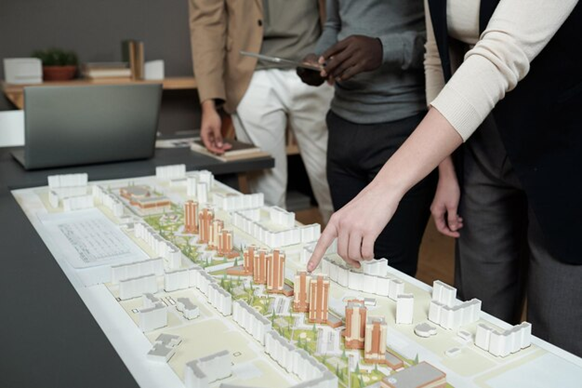Sustainable City Planning and Urban Design Program
This program is designed to provide students with the knowledge and skills required to plan and design sustainable and resilient cities, addressing urban and infrastructure development. Throughout the program, students will also receive training in soft skills such as communication, teamwork, and project management.
The curriculum will be regularly updated to keep up with evolving urban planning and infrastructure design practices and industry standards. Graduates of this program will be well-prepared for careers as urban and infrastructure planners and designers, focusing on creating sustainable and resilient cities.

Diploma in Sustainable City Planning and Urban Design
Duration: 2 years (4 Trimesters).
Prerequisites: High school diploma or equivalent.
SUSCPL 100: Introduction to Sustainable City Planning
- Overview of city planning and its role in sustainability
- Historical development of sustainable urban planning
- The role of city planners in creating resilient cities
URENV 100: Environmental Considerations in Urban Planning
- Urban environmental challenges and considerations
- Sustainable site selection and land use
- Climate-responsive planning
TRANSS 100: Sustainable Transportation Systems
- Planning for sustainable and efficient transportation
- Public transit systems and infrastructure
- Bicycle and pedestrian-friendly design
URSH 100: Occupational Safety and Health in Urban Planning
- Workplace safety regulations and practices
- Personal protective equipment (PPE) for urban planners
- Safety considerations in urban design
URDESI 100: Urban Design Principles
- Principles of urban form and layout
- Mixed-use development and walkable neighborhoods
- Urban density and zoning regulations
SUSIS 100: Infrastructure Systems
- Design and planning of essential infrastructure (water, sewage, electricity)
- Sustainable infrastructure design
- Utility coordination and sustainability
GREESD 100: Green Space and Parks Design
- Designing urban green spaces and parks
- Biodiversity and sustainability in urban green spaces
- Environmental and social benefits
BUILRC 100: Building Resilient Communities
- Designing for community resilience
- Neighborhood and community engagement
- Emergency preparedness and disaster response
WASMR 100: Waste Management and Recycling
- Sustainable waste management strategies
- Recycling and resource recovery
- Circular economy principles
WWASTI 100: Water and Wastewater Infrastructure
- Sustainable water supply and wastewater systems
- Stormwater management and sustainable drainage design
- Water conservation and treatment
EEREN 100: Energy Efficiency and Renewable Energy
- Designing energy-efficient urban systems
- Integration of renewable energy sources
- Sustainable urban lighting and power distribution
SUSBCO 100: Sustainable Building and Construction Practices
- Sustainable construction materials and methods
- Green building design and construction
- Sustainable building codes and regulations
INTURD 100: Integrated Urban Design Studio
- Sustainable urban planning and infrastructure design project
- Community engagement and stakeholder collaboration
- Presentation and documentation of urban projects
TTRFMAN 100: Transportation and Traffic Management
- Advanced transportation planning and design
- Traffic management and congestion reduction
- Sustainable urban mobility solutions
INFRDES 100: Resilient Infrastructure Design
- Planning for climate resilience and adaptation
- Disaster-resistant infrastructure design
- Risk assessment and mitigation
SUSCTES 100; Practical Training and Final Assessment
- Hands-on experience in sustainable city planning and infrastructure design
- Final assessment and evaluation of practical skills
- Successful completion of the program leads to the award of the Diploma in Sustainable City Planning with Urban and Infrastructure Design
Students have to contact the school administration if they want to take extra credits or transfer credits to pursue the Diploma Certificate or Associate of Applied Science (A.A.S.) Degree in their field of interest. Students will select required number courses in each of the areas listed to meet general education requirements graduation for the A.A.S. Some of these courses can be transferred directly from and to the university system and may be substituted for recommended courses on the outline. Students should speak with an advisor before doing so these selective courses are required for all students.
- Selected Communication Course (Choose two for Diploma or three for the Associate)
ENGL 100: Fundamentals of Speech
CPL 100: Career Planning
CPL 101: Communications and Career Strategies
ENGL 101: Composition
ENGL 102: composition
- Selected Mathematics Course (Choose two for Diploma or three for the Associate)
MATH 100:General Math
MATH 101:Intermediate Algebra
MATH 102:College Algebra
- Selected Social Science Course (Choose two for Diploma or four for the Associate)
ECON 105:Leadership
ECON 101:Principles of Microeconomics I
ECON 102:Principles of Macroeconomics II
SOC 101:Introduction to Sociology
PSYC 101: Introduction to Psychology
HIST 101: History
